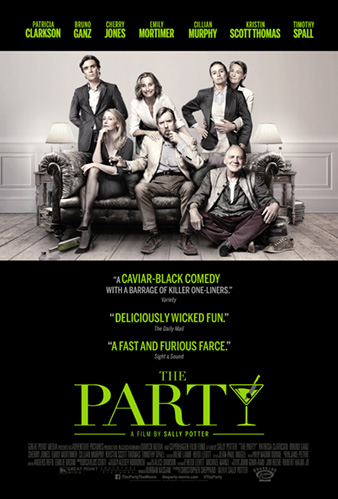Imagine yourself in a confined space. There are two ways in, yet it feels like there’s no way out. You’re surrounded by life-long friends who adore you, until they don’t and then all bets are off. As French philosopher Jean-Paul Sartre examined in his play No Exit, hell is just other people. More specifically, hell is who you think you’re supposed to be based on the company you keep for they reflect back to you who you think you really are. Embarking on a similar existential crisis are the characters within writer/director Sally Potter’s The Party, wherein a series of personal revelations comically obliterate a quiet gathering of old friends until almost everyone appears to be an enemy.

The premise of The Party is incredibly straight-forward: celebration is in the air as a small group of long-time friends gather to honor Janet’s (Kristin Scott Thomas) political appointment in the British government. The setting slowly shifts from hopeful exuberance to impassioned sorrow after Janet’s husband Bill (Timothy Spall) unknowingly sets off a series of revelations that upends everything the friends thought they knew about each other by sharing a secret. What starts as a refined evening of music, food, and friendship devolves into violence with a chance of gunplay.

The brilliance in this philosophical farce is the result of three successfully articulated plans: confined space, terrific actors, and the unsettling notion that what you’re witness to may not be the first time this is playing out. Everything we witness takes place in Janet and Bill’s home, with the only outside events taking place in a backyard that’s more high-walled brick patio than open space. This immediately sets up a notion that once inside, there’s no leaving. However, through a clever set design, there’s never a feeling of claustrophobia as our characters move from one portion of the house to another. They can choose to congregate in one place or spread out; whichever befits the moment within the story. Incidentally, this inserts some interesting fluidity into a fairly straight-forward narrative as the characters move from group scenarios to more intimate conversations and back without breaking the flow.

Potter amassed quite a cadre of actors whose excellence comes not from the louder, bolder moments, but from the subtle nuance that highlights the kinds of people these characters really are and bring forth a kind of existential torment befitting them all. Scott Thomas’s Janet is a civil servant whose nobility proves to be a charade. Patricia Clarkson’s April is a realist-turned-cynic who offers nothing but negative reinforcement for any suggestion not of her own making, even when the thought falls in line with something she believes. Cherry Jones’s Martha is a gender studies professor whose specialty is so narrow that her view of the world is one of peace and open love, no matter the amount or type of collateral damage incurred. Initially, we’re lead to assume that these three women are bound together, yet as the revelations come and their relationships are tested, their ideologies clash in potentially irreparable ways. Their companions – Bill, Ginny (Emily Mortimer), and Gottfried (Bruno Ganz) – represent antithetical viewpoints, which are argued and debated up until the final moments of the film as each is unwilling to relent his or her position. The only stand out is Cillian Murphy as Tom, the husband of late arrival Mary Anne, who is Janet’s coworker. Tom’s unease isn’t due to his solo status amidst the couples, but to his status as a man of finance. Unlike everyone else whose focus of thought is either metaphysical or concrete, Tom’s is in the service of money. This makes him the immediate odd duck at a party of philosophical sophisticates, and Murphy conveys this discomfort in hilarious ways.

The unexpected tricky bit of The Party is the narrative structure. As previously stated, the film begins with the end and then circles back around. This feels a lot like an examination of punishment for our worldly deeds in a film focused on the discussion of good deeds and bad intentions as a means of creating unperceived collateral damage. What better way to frame that then to put our participants – projected entirely in black and white – as doomed to repeat a cycle of heartbreaking discoveries because they never learn to consider others on their path of personal delight. Taken with this view in mind, a simple dinner party of friends becomes exactly as Sartre suggests, a torment wherein each of these individuals must eternally judge themselves against the way they think their friends see them. Are they noble? Skeptic? On a mission of divine revenge? A hell where you can never escape such a cycle – there you have The Party.

Though Potter’s film may not initially illicit a strong reaction – very little happens in The Party beyond words, words, words – something about it sticks with you for days. Perhaps it’s the complex theme of karmic redemption hidden with a simplistic, straight-forward narrative. Maybe it’s the staging that elicits stringent confinement in a reasonable, ample space or her purposeful script that seems to pit logic and reason against emotion and intuition. It could very well be her cast who commits so fully to expressing a wide range of emotions without dipping into caricature. Whatever it is, first impressions will inevitably shift once the audience is aware of the undercurrent theme at play. Keep in mind, this isn’t some modern day Clue with the audience trying to work out the truth. Rather, Potter lays the truth bare for us and challenges us to wonder why these characters can’t escape their fate. Buy a ticket and bear witness to one of the worst parties you’ll ever see.
Final Score: 4 out of 5.
[youtube= https://youtu.be/jojTG0_eXWM]
Find the latest details on The Party on Facebook | Twitter | Instagram | Website (US) | Website (Aus).
Limited theater rollout beginning February 16 2018. Currently expanding markets.





